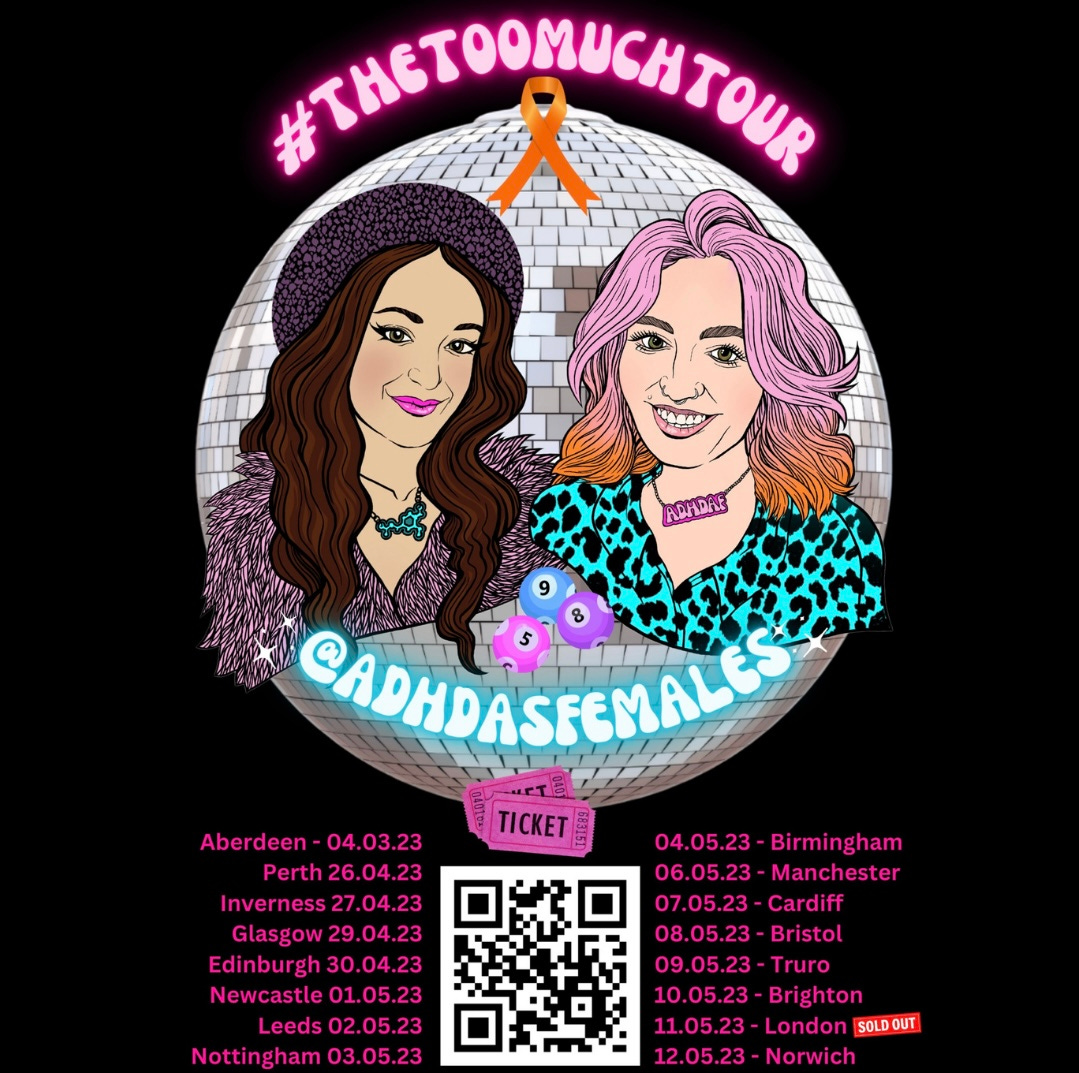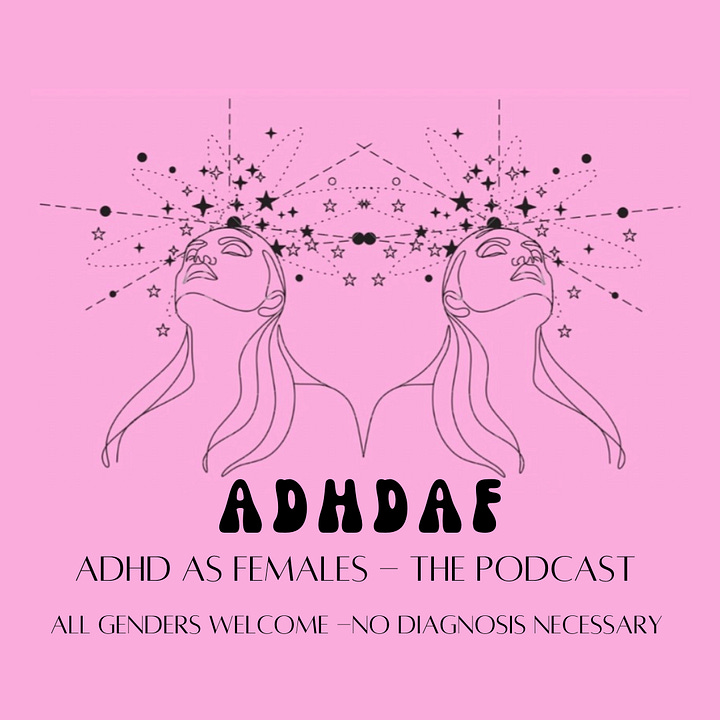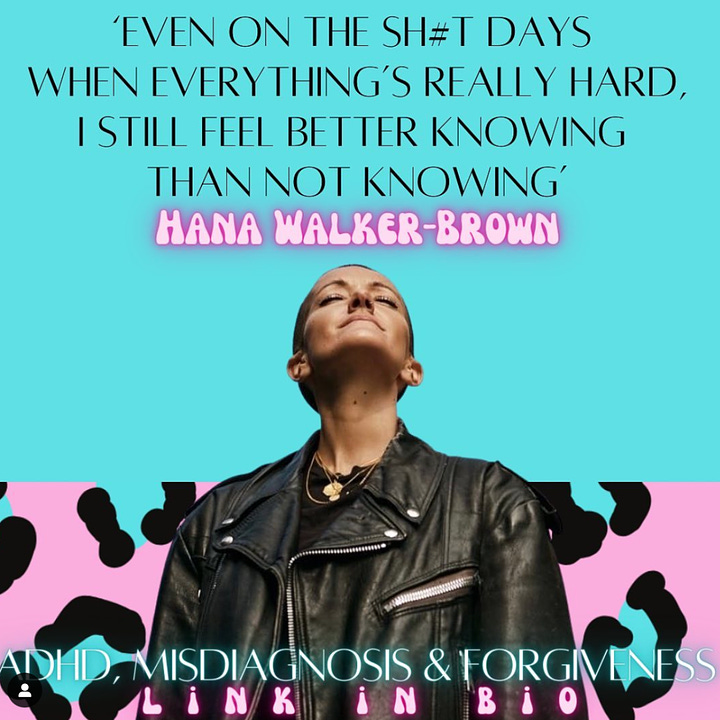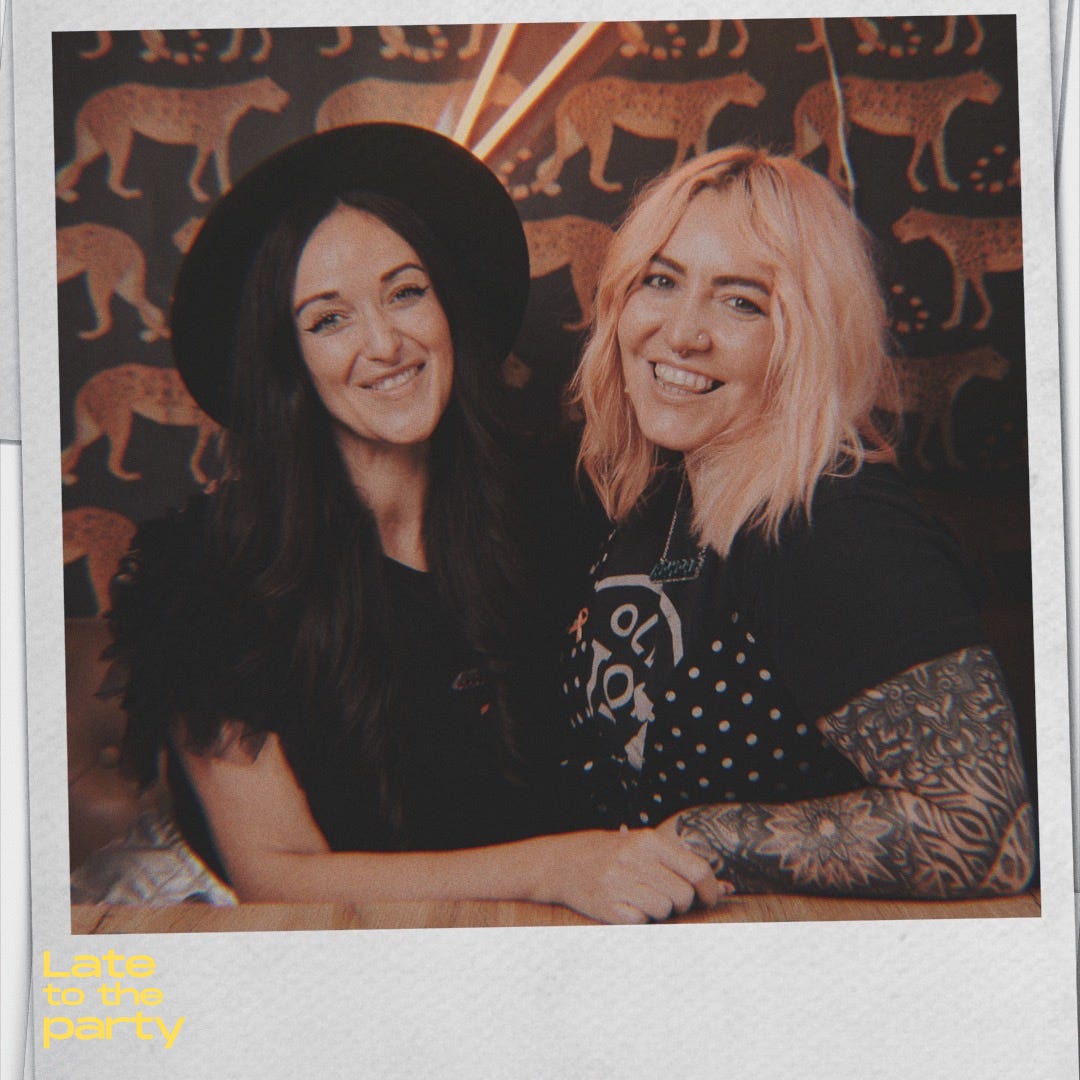Call it fate, call it the universe, call it magic.
Sometimes things have no explanation other than they were just meant to happen; however impossible or improbable, those mind-boggling moments that are built from something bigger than just coincidence and require you to suspend your disbelief.
Laura Mears-Reynolds & Dawn Marie Farmer are that moment personified.
They both moved to the same street in a unique and quirky village on Aberdeen Beach, Scotland called Fittie at the same time, at the same age, with the same undiagnosed disability, ADHD.
“Neurodivergent neighbours 6 doors apart!” they tell me “Serendipity.”
It was too good and but it was also true.
This compelled them to act and create their podcast and online community, ADHD AF, both of which are THRIVING. Although, that’s kind of an understatement at this point.
The podcast has over half a million downloads in 183 countries and a five star rating on Apple. I was lucky enough to be a guest last year and felt so safe and seen by both of them (in spite of some wild tech issues and a storm that i’d say i’m 90% sure we caused with our energy that night)
They also launched the anti ableist coalition to combat ableist ADHD Media of which I am a signatory and they are omnipresent online to provide support in a variety of forms and outlets to those who need it. They are also about to go on a tour of the UK.
“I’ve always said I feel like an alien.” Laura tells me, “It’s so lovely that having said this on the podcast so many have stepped forward saying they’ve always felt the same, and now we are all uniting - we have our own planet!”
“Planet” feels too small somehow. This is an ADHD solar system.
Every single day they receive messages from all over the world telling them that their experience is resonating, validating and helping people. Eradicating the shame surrounding ADHD - diagnosed or otherwise- and in turn raising awareness to influence systemic change.
“It’s become our life purpose” they tell me, and I couldn’t think of two better people to be leading this charge.
They are inspiring, funny, honest, and work unbelievably hard. When I ask them for their greatest strengths are they both list compassion, enthusiasm, determination and optimism. And it strikes me that in order to lead change, to spearhead the revolution, yes you have to graft but you also have to believe that it’s possible. The rage will propel you forward, but it’s hope that will carry you across the line.
They are a formidable double act. Even in moments they can’t see themselves succeeding, they tell me that they fight for the other to. And by combining forces they have enabled so many to believe that living a life and thriving with ADHD is possible, and that the future, if we’re willing to step up and into it, is ours for the taking.
This is a written interview that I did with Dawn and Laura so i’ve voiced this one, but you can hear them speak on my podcast Late to the Party when it launches very soon.
‘Before diagnosis - I WAS EVERYBODY ELSE! I so wanted the acceptance of those around me, that I mirrored their behaviour to become who I thought they wanted me to be. This hid who I was from all around me, and even myself.’
Dawn Marie Farmer
Hana: I’m interested in where all of this started for you. Can you tell me what was school like for you? What was your experience in education?
Laura: Fun, emotional and hard. LOLS I loved the social aspect, and I enjoyed the subjects I could engage with, but there was a lot of pressure from my parents to be academic rather than artistic - whereas I am a creative. I got in trouble a lot with both parents and teachers for being a high achiever in some subjects and not others. It gave the impression that I was more than capable but choosing not to try. This was backed up by my inability to meet deadlines or even attempt homework in some subjects. Without the knowledge of how ADHD can present, it looked like I was choosing to ‘waste’ my abilities and was purposely rebelling and not caring which led to truancy and me dropping out of school in sixth form. I did go back years later and do an access course at college and onto university, where I got a degree, but this was to meet the expectations of my parents. Inevitably, I didn’t do very well, and I haven’t to this day written that degree on a CV!
The RSD side of ADHD is very heavy for me, so I was often very upset about something said in the playground for eg, or embroiled in some sort of drama. But I had a huge group of friends and a lot of fun amongst the tears, so that made school bearable. But I was very frustrated with my inability to ‘switch on’ my focus. I was so afraid of getting into trouble, but I just couldn’t get certain work done, or on time. So I would lie awake at night consumed with dread. I barely slept for the entirety of my teens - which is really sad. When you think about it... I could’ve spent those lonely hours each night between midnight and 6am getting the work done instead of being worried sick about having not done it - except, as we know now - I JUST COULDN’T. Hindsight hey!
Dawn: At school I was very distractable and disruptive. Ironically I displayed the stereotypical traits of ADHD as the disorder was viewed in the 80s. But still, I was the wrong gender! Every single school report said the same thing ‘could try harder’, any ADHDer knows that one! In early primary school I was well behaved, but I was hyperactive and chatty, so very easily distracted. I excelled in the subjects I enjoyed but struggled to pay attention to anything else. Like Laura, school became about the social aspect as a teenager. I quickly learnt that I had the ability to make people laugh. So I adopted the class clown mask. Inevitably, this people pleasing act, and need for approval and validation got me into no end of trouble. My focus and morivation for school work declined as my self worth was eroded over time. I had pretty much given up by the time I left at 16. I desperately wanted to continue education so that I could achieve my dream of becoming a hairdresser, but the lack of self belief from my negative education experience, paired with the unknown ADHD symptoms meant that my drive, focus and enthusiasm was unsustainable, inevitably leading to dropping out of multiple courses.
Hana: Did you ever feel different? And if yes, in what way?
Laura: I’ve just never felt like I fit into society. I don’t seem to be driven by the same goals as I’ve perceived many around me do. My diagnosis is severe combined type ADHD, I also have the comorbidity of severe dyscalculia (amongst others) I’m very unbalanced, I’ve always joked that gravity doesn’t work for me (guess it’s different on my planet), one of the main things that makes me feel very different is my inability to drive. It’s not just a case of struggling to do all of those actions at once (which I can’t) but it’s a genuine fear. I look at others wondering how on earth they’re taking their lives into their hands everytime they go anywhere, and putting their trust in the strangers around them that they’re safe, like it’s totally normal. NO BIG DEAL! LOLS I just don’t get it! I semi constantly find myself looking around for the camera to pull a confused face into like Tim from the office. Did you hear that?! Is everyone else OK with this? We’re doing this now are we?! :) I just feel pretty weirded out in a lot of situations that other people seem to think makes sense and are the norm.
Dawn: At school I could never understand how other kids could sit still and pay attention. I never felt as if I was ‘enough’... I could never be well behaved ‘enough’, clever ‘enough’, good ‘enough’, fit ‘enough’. In every aspect I always felt I fell short. Whilst watching peers excel in certain areas, and although I can be good at many things, I’ve never felt I could be good ‘enough’ to be great at anything. Jack of all trades, master of none.
Hana: Who were you before your diagnosis?
Laura: I was the very definition of a hedonist. My personal struggles in relationships of all kinds, in the world of work, with an eating disorder and body dismporphia and mistreatment I suffered had made me think I’d paid my dues to ‘real life’. I’d had enough of feeling so awful and needed to find some joy in my time on this planet. I needed to escape horrible reality and make my life feel as though it had been ‘worth it’. The thing is though like many, I confused fun for happiness. They’re not the same thing. I’ve had RIDICULOUS amounts of fun! Just not that much happiness. I’ve always had acute anxiety and bouts of depression, and sadly you can’t party or travel them away. Believe me, I’ve tried! In the end, the very thing I was doing to escape the anxiety and depression was feeding both. The cure and the cause. I guess my unique trait would be trying to make use of my time. I feel like time is running away from me. I want to have the best life I possibly can. I still have that now, but it’s shifted from wanting to be able to look back and say WOW - I did X, Y and Z to now - I have actually made a difference.
Dawn: Before diagnosis - I WAS EVERYBODY ELSE! I so wanted the acceptance of those around me, that I mirrored their behaviour to become who I thought they wanted me to be. This hid who I was from all around me, and even myself.
Since identifying ADHD in myself and recognising the unknown masking I’d employed, I’ve started discovering who I truly am and what my values are. One major difficulty would be romantic relationships. I spent far too long meeting the needs of others and accepting unacceptable behaviour. The cost of this was further erosion of my self worth which led to making further bad partner choices.
Hana: Did you know anything about neurodiversity or have any references for what you might be experiencing pre diagnosis?
Laura: I knew that I had dyscalculia but I didn’t know that fell under the umbrella of Neurodivergence - in fact, I only even heard or noticed that word this year. I also didn’t realise quite how enormously that affects different areas of my life. I saw myself as traumatised by various events and I had years of therapy at different stages, hypnotherapy, allsorts, but it wasn’t until a friend told me that she had been diagnosed that I discovered ADHD wasn’t just naughty little boys and blue smarties etc, I instantly knew that that I had been unknowingly battling a brain disorder my entire life.
Dawn: It’s been an ongoing joke amongst family and close friends that I had ADHD my entire adult life, but due to the gender and age stereotypes I never took it seriously. I also mentioned to a therapist who dismissed it straight away due to being able to converse with her. Ironically it was ADHD hyperfoucs that enabled me to do so! Again, our experiences serendipitously mirror each others; it wasn’t until a friend mentioned it in conversation that the penny dropped.
Hana: Can you tell me about your journey to seek a diagnosis from start to finish?
Laura: After an initial appointment, I was sent forms in the post. Myself and my husband completed them straight away and sent them off in 2018...and I never heard back! In 2021 my husband’s new job gave me access to Bupa healthcare. Having discussed starting this diagnosis journey with my new neighbour Dawn who was about to start hers I investigated if Bupa covered ADHD diagnosis. I was told if I also had depression then it would, which by this point I had VERY SERIOUS depression. I was given the name of a local psychiatrist but needed to make the appointment myself. It took a bit of work, but eventually I got hold of her in November 2021. The assessment was scheduled for a phone call in January 2022. It was one hour over the phone and I wasn’t asked for any ‘proof’ - thank God, because I don’t have any school reports having moved all over the place. By the end of the hour call I had been diagnosed. A letter was sent to my GP requesting shared care. Which at first was denied, it was awful! Eventually after a lot of begging and reasoning from myself and the psychiatrist, in March of 2022 I started treatment. So that’s 4 years in total from start to finish. The going private bit took 3 months from request to diagnosis and treaments took 5 months from request to medication.
Dawn: After initially approaching my doctor, I was asked to complete a short questionnaire which I returned, alongside blood my blood pressure and weight for referal, in May 2021. I had heard nothing back, so in August 2021 I chased the GP up; as a result of doing so it was only then that I received my referral letter. I started university that September and advised that I was awaiting ADHD assesment, as a result of which I was put in contact with the access team for an assessment with an educational phsycologist, who confirmed after one meeting that I had ADHD. This enabled me to support with my studies, and to my mind was an official ADHD diagnosis. I took this report to the NHS psychiatrist in the hope that this would be the confirmation needed to get medical treatment for the symptoms I battle to no avail. My therapist and I chased them reletntlessly for months on end, and finally in February 2022 I was told I was 4th on the list for NHS ADHD assesment. The wait continued, so I continued to chase... I finally got an appointment date confirmation in September 2022 for October. Sadly, however this was not my assessment but just part one of an undisclosed number of appointments, the second of which was a four month wait away. Thanks to the generosity of our podcast listeners donations I was able to get a private assessment in November, with a follow up appointment in December which confirmed combined type ADHD.
‘This is a monumental moment of mass awareness, not mass hysteria. People need to be educated in every sector about how ADHD can present so that it can be viewed and treated the same way as every other disability.’
Laura Mears-Reynolds
On their podcast, Dawn and Laura explore the late ADHD diagnosis grief roller coaster, and we ask each guest where they are up to. Its something that I have thought about a lot and it’s not a linear process but i’m interested in where they are themselves.
Laura: I can identify the Grelief stage - the initial relief and grief combined. I believe that in the early days of our podcast, that was bargaining... ‘if I can just make a difference then it’s fine that I have this’ - I didn’t think that at the time, consciously anyway - but I can see it in hindsight. There was a terrifying anger which burned for so long I wondered if it would ever stop. The very flames of it fuelled the fire to push and push with creating our podcast and platform. But I don’t feel it anymore THANK GOD! Of course there’s things I’m angry about - MAINLY THE SYSTEM! But i’m not being driven by rage anymore. I was very depressed - I don’t know if I’ve ever not been depressed. But I’m certainly not depressed like I was. I mean God knows, am I at acceptance??!!! That would be nice hey, definitely don’t need anymore rage or depression!
Dawn: Having recieved my diagnosis from the Educational Psychologist at the end of last year to ‘the diagnosis’, I started the grief cycle then. I instantly burst into tears with both relief and sadness at how let down I’ve been by the system. But having only just received the official medical diagnosis a week ago, I’m surprised to find myself back in the denial stage. But as we see it as a roller coaster rather than linear, I’m hopeful that I don’t have to experience all of the stages of grief again.
Hana: What has the process of going through a diagnosis taught you?
Laura: that the diagnostic process DESPERATELY NEEDS CHANGING! The disparities, contradictions, lack of adequate training, understanding, resources and stigma need addressing URGENTLY. We are in the midst of a crisis and I’m trying to do my bit. People need help urgently, change needs to happen immediately.
Dawn: That you have to advocate for yourself. People like myself are in desperate need of help but they’re not going to access it, without having to fight for it. As a late diagnosed ADHDer, with eroded self worth it’s hard to advocate for yourself. On top of that the system makes us battle the very symptoms that we need treatment for in order to access the treatment! IT’S BEYOND A JOKE!
Hana: We’ve seen neurodiversity minimised to a “trend” and we still aren’t seeing nuanced representation. What do you think needs to change?
L & D: This is a monumental moment of mass awareness, not mass hysteria. People need to be educated in every sector about how ADHD can present so that it can be viewed and treated the same way as every other disability.
Hana: What is something you wish people knew about neurodiversity?
L & D:That ADHD is real! And that 1 in 40 adults are estimated to have it. There are undiagnosed ADHD people all around you suffering. The people that are dismissed as lazy, late, uncaring, etc.. are possibly battling brain disorders. ADHD can contribute to major problems in society. Including; teenage pregnancy, divorce, drug abuse, alcoholism, unemployment, criminality and incarceration. ADHDers are five times more likely to commit suicide. If we can take this problem seriously and invest money into research, treatment and education then the money that is used to help with all of the above listed problems can be saved, and most importantly, LIVES CAN BE SAVED!
Hana: What advice would you give someone who might be thinking about seeking or going through a diagnosis themselves?
L & D: Arm yourselves with all the knowledge and tools. We shouldn’t have to fight a battle to receive treatment and respect but in most cases we do. So armour up.
Hana: Why do you think that you were you late to the party?
Laura: My ‘otherness’, I’m mixed race. We moved to Norwich when I was a child, a lot of my friend’s parents were either born and bred Norfolk, or from the next county or if not just from different parts of the UK. My mother is Caribbean and my Dad’s Irish. Nobody looked like me, or shared similar experiences or backgrounds to me. I knew I was different, and I thought that was why. So I put my energy into fitting it. I unknowingly masked my struggles and ADHD traits even from myself. I then blamed my mental health struggles on trauma. But the overriding factor of it all is that I am female, and didn’t fit the stereotype.
Dawn: Because society saw me as the wrong gender, and in turn teachers stereotypical view led them to write me off as lazy and rebellious. Being made to feel like a failure, eroded my self confidence and worth making it near impossible for me to advocate for myself.
Hana: What are you looking forward to in the future?
Dawn: More self belief and more self love…
Laura: …and rallying the troops and leading our leopard print army into battle!
Speaking of leopard print army….
The #TOOMUCH Tour

Dawn and Laura are currently on tour and I will be joining them in Truro, Cornwall on the 9th of May.
TOO MUCH is a celebration of unmasking ADHD and our ADHD As Females Podcast listeners. It is also a UK ADHD Awareness raising mission. You don’t need to have heard the podcast; just come with a mind open to learning about the enormity of the impact of the neurodevelopmental condition and in particular, its late discovery can have. They are uniting ADHD Community in the name of validation, camaraderie, compassion, understanding, ADHD awareness and LOLS. Peer to Peer support is invaluable in the late diagnosis process!
ADULTS ONLY - ALL GENDERS WELCOME - NO DIAGNOSIS NECESSARY!
Celebrate your ‘Too-muchness’ with Dawn and Laura and learn more about this misunderstood condition through real life experiences…
Side bar: they would LOVE you to wear leopard print.


I was lucky enough to be a guest on the brilliant ADHDAF podcast. You can listen to my episode below (but would strongly advise you start from episode one and listen to every single ep!)






